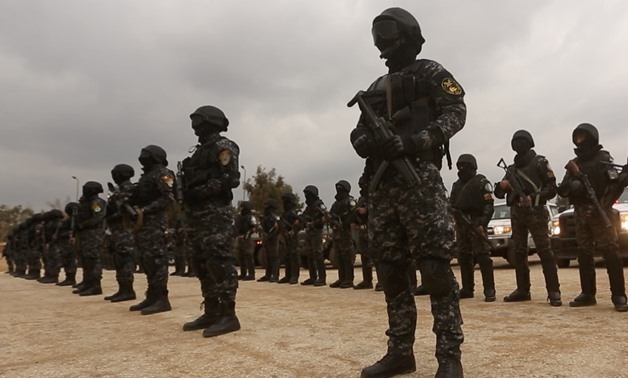
Security services intensify and a larger number of security forces are deployed at fixed checkpoints, February 9, 2018 - Press Photo
CAIRO - 4 October 2019: A security source at the Ministry of Interior slammed a statement issued by Egypt's National Council for Human Rights, through which the agency claimed that some people got arrested by security forces without being told their charges in advance.
The security source accused the council of obtaining information from unreliable sources seeking to cause confusion and tension in the Egyptian streets.
The source confirmed, according to the ministry's statement that "all cases of arrest that took place during the past days, came in accordance with the law, including cases of flagrante delicto, that allows the judicial officers to search persons and their movable belongings movable (mobile phones or otherwise according to the law)."
The Ministry called for obtaining information from the concerned authorities.
The National Council for Human Rights expressed rejection of police's inspection of civilians' smart phones, and other "arbitrary" security measures, saying that such acts violate the Egyptian law and Constitution.
During the 74th session of the council it had discussed and reviewed the human rights situation in the country. Although the council affirmed its understanding of the serious situation faced by the country as a result of its war on terrorism, the council members have criticized some recent incidents, including arbitrary security measures faced by some citizens.
Firstly, the unjustified expansion of the arrest of citizens crossing the roads and squares without legal justification, and without enabling them to contact their relatives and their families, and without even informing them of the charge they face. The council said that this represents a violation of human rights guaranteed by the Constitution and the law.
Secondly, stopping citizens while walking in the streets and forcing them to hand their mobile phones to the police personnel so they can inspect the content on the phones, in violation of many provisions of the Constitution that protect the sanctity of private life of citizens and also the privacy of their conversations, including the electronic means of communication.
Thirdly, many members of the council noted that the recent crisis exposed the deteriorating situation of the national media, including its failure to carry out its mission as a national source of information. The members said that this situation made some sectors of Egyptians to resort to foreign media, while some of these platforms lack credibility and professionalism, and promote terrorism and violence.
Egyptian cities have witnessed tightened security measures recently, after Muslim Brotherhood supporters and some anti-government activists called on people to take to streets, particularly Cairo's Tahrir square, known for public protests, in a bid to oust the current political leadership. However, such attempts were strictly prevented.
Many citizens, especially in the streets of the downtown area of Cairo, where Tahrir square is located, were stopped by police personnel and were asked to hand their phones for inspection.
Some argue that they got their Facebook pages and mobile gallery inspected.


Comments
Leave a Comment